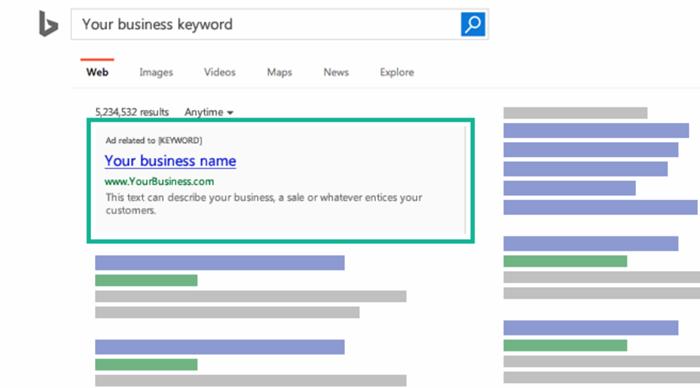Paid search, also known as pay-per-click (PPC) advertising, is a part of search engine marketing (SEM). It's an effective way to drive search traffic your way quickly and consistently. But how does it work? And why should small and midsize businesses (SMBs) be using it?
Here's how a PPC ad works:
- Someone enters a query into a search engine, such as Bing or Google; the query could be one word, a phrase, or a question.
- That search engine decides which paid ads will be displayed at the top; that decision is based on a few factors, including ad relevance, landing page value, the cost-per-click (CPC) bid on the keywords used, and the ad position.
- The search engine then displays a series of paid ads at the top of the search page, followed by organic (nonpaid) results.

Rather than pay a set price to run an ad for a specific length of time, with PPC advertising businesses pay only when someone actually clicks on the ad.
No matter the size of your business, whether it's an online store, a brick and mortar shop, or an enterprise with multiple locations, paid search can help your business become more searchable, visible, and valuable to potential customers.
Here are four reasons you should make paid search an integral part of your digital marketing strategy.
1. You put your brand on broadcast
PPC campaigns help you get your business's name out there, making it more discoverable.
Let's say you run a small jewelry store, and a potential customer searches online for pearl earrings. As a small store with an online marketplace, your organic ranking may be low on the search engine result pages (SERPs), maybe even buried on the third or fourth page! People aren't going to find you there very easily.
But, by running a PPC ad using keywords that match relevant search queries, there you are, popping up at the top of the first page of search results.
These ads place your business front and center, helping you build continual customer awareness and brand authority. Even if someone doesn't click on your paid ad, you're increasing exposure and building business visibility—for free.
2. You control your spend
As a small business, your marketing budgets can be tight, or even nonexistent, but don't let that scare you away from PPC. Yes, every time a visitor clicks on your ad, you pay the search engine a small fee, but that site visit is often worth more than you are paying for the click.
And with paid search, you get to set your own budget and spend only as much as you choose: When you implement budget caps, search engines will never spend more than you tell them to.
And the more relevant you make your ads, the higher the quality score you receive from the ad platform, and the cheaper your overall spend becomes.
3. You engage with your target audience
PPC ads help small businesses secure more qualified leads by using a variety of audience targeting tools. Instead of throwing a wide net, you can zero-in on the demographics of your audience and the keywords that count.
Consider your target audience's location, the time of day they would most likely search for your good or service, and the device they would most likely use. Then fine-tune your ad so the dollars you devote to the campaign really matter.
Let's say you own a small coffee shop in Bellingham, WA that's open 6 AM to 2 PM. Use that information to create a targeted ad campaign:
- Set your ad location to target only those searching for coffee shops in Bellingham.
- Set the ad to run only run during your hours of operation.
- Analyze your device data: It may be safe to assume that many people are searching for a coffee shop while in transit, so set ads up to run on mobile devices.
Taking this approach will help ensure that the traffic you drive to your site is qualified and the clicks you're paying for result in customer conversions.
4. It's an easy-to-use platform
The only thing that's required to set up a successful PPC campaign is a website. Why? You have to have somewhere to send the people who click on your ads. That could be a specific landing page created for the ad, your homepage, a product page, or category pages on your site.
Many of the search engine platforms, including Microsoft Advertising (formerly Bing Ads) and Google Ads, make it easy for a first-timer to get started. Videos, real-world examples, how-to articles, keyword planners, and even assistance establishing and maintaining a strong budget is available (for free) online.
And once you create an ad campaign in one platform, it's easy to expand your online advertising reach by importing that campaign to other platforms.
Remember: SEO and PPC go hand-in-hand
The best way to make your mark in the digital space as a small or medium-sized business is to integrate your PPC campaigns with search engine optimization (SEO).
SEO helps your site rank higher in organic search results and includes onsite changes to content, metadata, and external link building. Good SEO communicates to Google and Bing that your website is helpful and relevant, and that it will assist someone with their search query.
When you build a website that has valuable content and user-friendly navigation and uses basic SEO best-practices, more people will organically find you; but, just as important, the PPC ads that link to those webpages will get a bump in their quality score and ad ranking, too.
SEO can take months to make a difference, but it certainly will. In the meantime, PPC advertising can provide instant visibility to a relevant, targeted audience. Combine this flexible form of advertising with long term SEO strategy for the ultimate approach to digital marketing.




